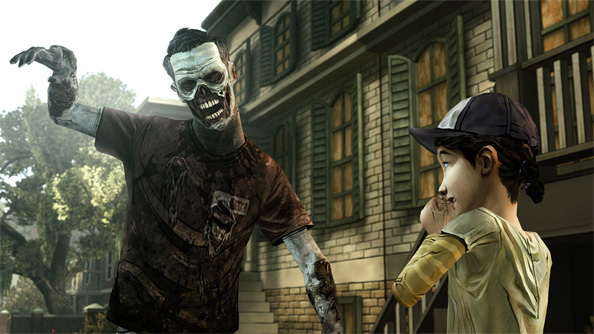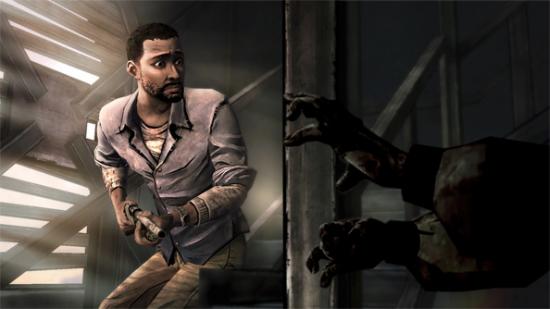In a medium dominated by normalized white male protagonists, many developers face resistance trying to introduce a lead character that breaks from the norm. At their GDC panel titled “Saving Doug: Empathy, Character, and Choice in The Walking Dead”, the game’s co-creative leads Jake Rodkin and Sean Vanaman discussed their choice to have a black protagonist, and how that affected the game.
They started off by de-emphasizing the importance of Lee’s race to the developers early in the design process. After giving a list of all the attributes the team had decided early on that their game’s main character should have, they told the audience of developers and journalists, “You’ll notice that Lee’s race is not on the list [of attributes the developers wanted their main character to have]. And I wanted to talk about that… Lee’s race was informed by what we viewed as social facts of the American Southeast.”
But they quickly followed up that Lee’s race was a choice that the team had to consider and debate for awhile, acknowledging that “white has been the de facto choice for videogame protagonists, so it’s not like we didn’t have really long conversations about this.”
And while it wasn’t a quick decision, the designers were very adamant that it wouldn’t be a game-defining one. “The Walking Dead is a game that is not about race, but it would be very minute to say that race does not play a role in the politics of the game.
“When you make choices about who your characters are, yes, you are defining the context of your game. But you’re not defining the thematic thrust of it, and that’s very different. Games that feature women or minorities, members of lower socio-economic status as protagonists—any non-typical, non-male, non-white protagonist—they don’t have to automatically be about those things.”
Rodkin’s and Vanaman’s perspective and discussion came across as extremely mature and practical. The team wasn’t trying to make a social or political statement—they’re just trying to create great characters that the player can interact with, and race is just one of the many elements they used to make Lee an exceptional character in The Walking Dead.
While both downplayed the need to focus on race as a central plot element, they clearly felt a sense of responsibility to represent the character’s racial context respectfully and accurately. They explained, “The Walking Dead features a black man in the leading role. But while it’s not about race, it has to feature the politics of race in the game context to be honest. The same goes for if your lead character is a woman. It doesn’t have to be—and maybe it shouldn’t always be—a game about femininity, but it has to consider and has to be empathetic to the politics of gender to be meaningful content.”

As game designers around me scribbled notes furiously, the pair on stage warned them that every situation is different. “The selection of race is a game design choice that you make in your game as a designer, because it’s creating the context that we talked about before. And, for us especially, we stripped out so many elements, that every decision we made about who these characters were made a bigger thumbprint on the game than maybe it normally would.”
When creating characters that are influenced by their ethnicity, designers have to be careful that they aren’t just building a one-dimensional stereotype. The pair warned that the protagonist needs to be a fully developed person, with a backstory and life experiences that shape their outlook on the situations the player shares with them.
“The things Lee would say in response to a sticky situation or even a subtly racist barb are defined, not just by the color of his skin, but also by the life experiences he’s had that we’re asking you to share with him. And then you’re going to go on and share more experiences with him, thus creating even broader context for the decisions he can make in those situations. The game is asking you to carry Lee’s personal experience along with the experience that you’re going to go on in-game.”
This perspective is the key: race is being used to help build an empathetic and interesting character that the player can play alongside. The end goal is making a better game.
“Asking you to carry baggage is important philosophically. As players build a relationship with who he is, we tried to give you a broad emotional palate to determine who Lee now is, not who he was. And going from was to is with the same person builds a very personal narrative in mind.”
Part of that journey is showing the player the trials endured by the character. And while Lee faces many demons caused by his past life (he starts off the game as a convicted murderer, after all), it’s important to consider race in this area. The Telltale duo explained one way that this affected gameplay: conversations with Larry (a hardly subtle racist) were designed to be extremely difficult to navigate, and nearly impossible to win, because that’s how it would be for Lee.
But what was perhaps the best example of the co-creative leads’ opinion on race in games came near the end, when they mentioned that Clementine, the little girl that Lee looks after, comes from a mixed-race family. Her entire life situation and family heritage has been built and crafted, even though it will probably never be brought up in the game. But that context is extremely important to her character and her relationship with Lee. The team used it to enhance the subtle emotional experiences found throughout the entire game.
That’s what The Walking Dead creators want to see race used for in their game: not as a cheap trick, not as a one-dimensional stereotype, but as just one of many defining attributes and life experiences that mold their creations into lifelike characters that can inspire love, hate, envy, and all the other tough-to-grab emotions in gamers.
And after playing through the first season, and crying alongside the rest of you at the end, I hope we see a lot more of this.
